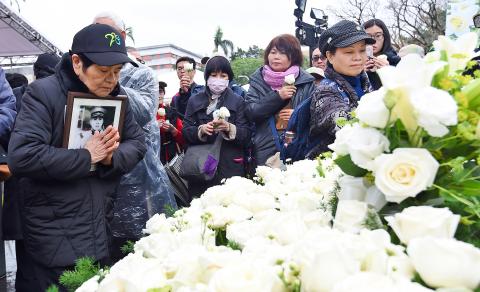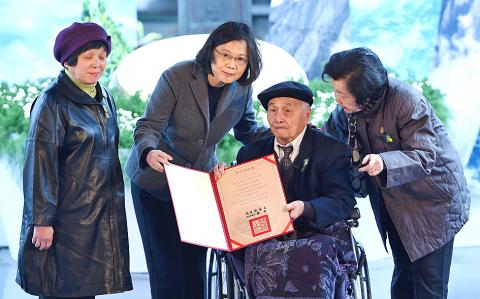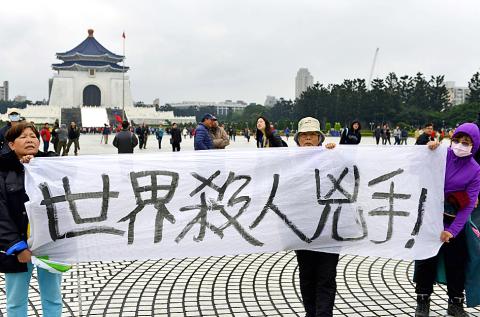President Tsai Ing-wen (蔡英文) yesterday pledged to clarify the attribution of responsibility for the 228 Incident in the most discreet manner possible, adding that she hoped future anniversaries of the tragic event could be marked by national unity.
Tsai made the remarks in her first speech on the 228 Incident as president, which was delivered at a memorial ceremony at the 228 Peace Memorial Park in Taipei on the 70th anniversary of the massacre.
“On Saturday last week, the Ministry of Culture proposed transforming the Chiang Kai-shek (蔣介石) Memorial Hall. This is the 70th anniversary of the 228 Incident and it is about time that changes are made. I believe Taiwan’s democracy is mature enough to have a discussion,” Tsai said.

Photo: Liu Hsin-de, Taipei Times
Reconciliation must be built upon truth, Tsai said, adding that the National Archives Administration would launch a new effort today to collect and organize documents concerning the Incident and the White Terror era that have been scattered across different government agencies.
Tsai said the results of the effort would provide the foundation for the government to compile a national investigative report on transitional justice, which would dedicate an entire section to the Incident.
“However, I must stress that we will adopt the most discreet attitude when dealing with the attribution of responsibility for the 228 Incident,” the president said.

Photo: Liu Hsin-de, Taipei Times
The 228 Incident refers to a crackdown launched by the then-Chinese Nationalist Party (KMT) regime against civilian demonstrations following an incident in Taipei on Feb. 27, 1947.
The ensuing massacre and imposition of martial law marked the beginning of the decades-long White Terror era, during which thousands of Taiwanese were arrested, imprisoned and executed.
Bereaved families have long lamented the government’s failure to officially identify the main culprit responsible for the massacre.

Photo: AFP
Shrugging off criticism that the economy should take precedence over transitional justice, Tsai said that economic growth and social justice are equally important and the goal should be pursuing both.
Tsai concluded her speech by expressing the hope that the realization of transitional justice would free all political parties from the past authoritarian baggage, ensure the recovery of truth, facilitate reconciliation between the victims and the perpetrators and remove traditional political taboos.
“I also hope that the draft transitional justice promotion bill will clear the legislative floor in the current legislative session … so that we can have an independent agency responsible for promoting transitional justice,” Tsai said.
Hsueh Hua-yuan (薛化元), chairman of the 228 Memorial Foundation, said that the victims’ families have been longing for the truth and identification of responsible parties.
“As far as the foundation is concerned, finishing the transitional justice report to prevent history from being repeated is the most crucial and fundamental purpose of transitional justice,” Hsueh said.
The commemorative ceremony, despite being briefly interrupted by protests, also saw the president hand out certificates of good character to a number of victims of the 228 Incident or their families to restore their reputations.

The CIA has a message for Chinese government officials worried about their place in Chinese President Xi Jinping’s (習近平) government: Come work with us. The agency released two Mandarin-language videos on social media on Thursday inviting disgruntled officials to contact the CIA. The recruitment videos posted on YouTube and X racked up more than 5 million views combined in their first day. The outreach comes as CIA Director John Ratcliffe has vowed to boost the agency’s use of intelligence from human sources and its focus on China, which has recently targeted US officials with its own espionage operations. The videos are “aimed at

STEADFAST FRIEND: The bills encourage increased Taiwan-US engagement and address China’s distortion of UN Resolution 2758 to isolate Taiwan internationally The Presidential Office yesterday thanked the US House of Representatives for unanimously passing two Taiwan-related bills highlighting its solid support for Taiwan’s democracy and global participation, and for deepening bilateral relations. One of the bills, the Taiwan Assurance Implementation Act, requires the US Department of State to periodically review its guidelines for engagement with Taiwan, and report to the US Congress on the guidelines and plans to lift self-imposed limitations on US-Taiwan engagement. The other bill is the Taiwan International Solidarity Act, which clarifies that UN Resolution 2758 does not address the issue of the representation of Taiwan or its people in

US Indo-Pacific Commander Admiral Samuel Paparo on Friday expressed concern over the rate at which China is diversifying its military exercises, the Financial Times (FT) reported on Saturday. “The rates of change on the depth and breadth of their exercises is the one non-linear effect that I’ve seen in the last year that wakes me up at night or keeps me up at night,” Paparo was quoted by FT as saying while attending the annual Sedona Forum at the McCain Institute in Arizona. Paparo also expressed concern over the speed with which China was expanding its military. While the US

SHIFT: Taiwan’s better-than-expected first-quarter GDP and signs of weakness in the US have driven global capital back to emerging markets, the central bank head said The central bank yesterday blamed market speculation for the steep rise in the local currency, and urged exporters and financial institutions to stay calm and stop panic sell-offs to avoid hurting their own profitability. The nation’s top monetary policymaker said that it would step in, if necessary, to maintain order and stability in the foreign exchange market. The remarks came as the NT dollar yesterday closed up NT$0.919 to NT$30.145 against the US dollar in Taipei trading, after rising as high as NT$29.59 in intraday trading. The local currency has surged 5.85 percent against the greenback over the past two sessions, central